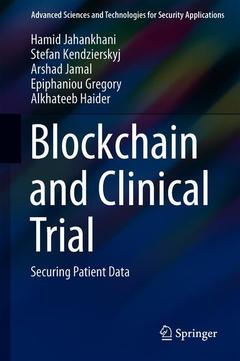Description
Blockchain and Clinical Trial, 1st ed. 2019
Securing Patient Data
Advanced Sciences and Technologies for Security Applications Series
Coordinators: Jahankhani Hamid, Kendzierskyj Stefan, Jamal Arshad, Epiphaniou Gregory, Al-Khateeb Haider
Language: English
Subjects for Blockchain and Clinical Trial:
267 p. · 15.5x23.5 cm · Hardback
Description
/li>Contents
/li>Biography
/li>Comment
/li>
This book aims to highlight the gaps and the transparency issues in the clinical research and trials processes and how there is a lack of information flowing back to researchers and patients involved in those trials.
Lack of data transparency is an underlying theme within the clinical research world and causes issues of corruption, fraud, errors and a problem of reproducibility. Blockchain can prove to be a method to ensure a much more joined up and integrated approach to data sharing and improving patient outcomes. Surveys undertaken by creditable organisations in the healthcare industry are analysed in this book that show strong support for using blockchain technology regarding strengthening data security, interoperability and a range of beneficial use cases where mostly all respondents of the surveys believe blockchain will be important for the future of the healthcare industry.
Another aspect considered in the book is the coming surge of healthcare wearables using Internet of Things (IoT) and the prediction that the current capacity of centralised networks will not cope with the demands of data storage. The benefits are great for clinical research, but will add more pressure to the transparency of clinical trials and how this is managed unless a secure mechanism like, blockchain is used.
Foreword.- Blockchain and Healthcare.- Digital Transformation of Healthcare.- Healthcare Patient and Clinical Research.- Information security governance, technology, processes and people: Compliance and organisational readiness; B. Papp-Silva et al.-Cyber-Physical Attacks and the Value of Healthcare Data: Facing an Era of Cyber Extortion and Organised Crime.- The Transparency of Big Data, Data Harvesting and Digital Twins.- Blockchain for Modern Digital Forensics: The Chain-of-Custody as a Distributed Ledger.-The Standardised Digital Forensic Investigation Process Model (SDFIPM).- Hybrid Cyber security framework for the internet of medical things.- BMAR - Blockchain for Medication Administration Records.- Recent Cyber Attacks and Vulnerabilities in Medical Devices and Healthcare Institutions.
Prof. Hamid Jahankhani gained his PhD from the Queen Mary College, University of London. In 1999 he moved to the University of East London (UEL) to become the first Professor of Information Security and Cyber Criminology at the university in 2010. Over the last 15 years he has also been involved in developing new and innovative programmes and introducing “block mode” delivery approach at UEL, including MSc Information Security and Computer Forensics, Professional Doctorate Information Security.
Jahankhani’s principal research area for a number of years has been in the field of cyber security, information security and digital forensics. In partnership with the key industrial sectors, he has examined and established several innovative research projects that are of direct relevance to the needs of UK and European information security, digital forensics industries, Critical National Infrastructure and law enforcement agencies. He has planned, proposed and managed several collaborative projects, and secured a substantial research income of up to £6m. Professor Jahankhani is the Editor-in-Chief of the International Journal of Electronic Security and Digital Forensics, and International Journal of Electronic Democracy, both published by Inderscience, and general chair of the annual International Conference on Global Security, Safety and Sustainability (ICGS3). Hamid has edited and contributed to over 15 books and has over 150 conference and journal publications together with Various BBC radio interviews. Jahankhani has supervised to completion 13 PhD and professional doctorate degree students and overseen 67 PhD students progressing. In summer 2017 Hamid was trained as the GCHQ “cyberist” to train the next generation of cyber security experts through GCHQ CyberFirst initiative.As part of his research in partnership with the key industrial sectors, Jahankhani has examined and established several innovative research projects that are of direct relev
These books may interest you

Blockchain in HealthcareInnovations that Empower Patients, Connect Professionals and Improve Care 40.18 €

Blockchain in HealthcareInnovations that Empower Patients, Connect Professionals and Improve Care 61.25 €

Blockchain for Business 30.47 €

